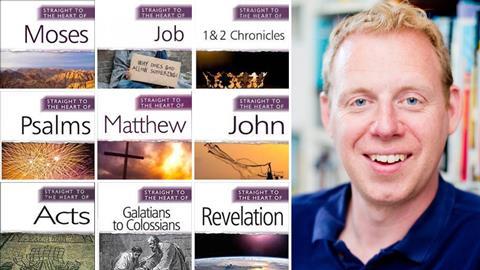The London based pastor Phil Moore has spent the past decade writing a commentary on every book of the Bible. Having just completed the mammoth project, he tells Sam Hailes what he's learned through studying the scriptures in their original languages, and why those struggling to read the Bible in a year should be less hard on themselves

Congratulations on writing a commentary on every book of the Bible! How does it feel to be on the other side of the project?
I’ve absolutely loved writing the 'Straight to the Heart' series – but I have to admit that it feels really good!
I signed the contract to write and publish the series on the day after my daughter was born. She’s now 13, and a visual reminder of how long I have been working on the series!
How did the idea for the series come about?
The series was birthed in my mind when I was serving as an evangelist in Paris. I was helping people to study the Bible in French and I discovered that some of what it said wasn’t the same as in my English Bible. This made me want to be able to read the original text in Greek and Hebrew, which helped me to discover that the English and the French Bibles were equally right. There is a depth of meaning to words in Greek and Hebrew which modern languages draw out differently.
Having discovered this, I spent four years working through the Bible twice in the original languages, making thousands of pages of detailed notes on my computer. It was a very exciting season for me, reading the Psalms of David and the letters of Paul as they actually wrote them, without a translator getting in the way. It felt like up till now I had been playing the piano with ski gloves on, but now I was able to feel the keys and to play notes in my Bible reading that I’d never played before. It felt incredibly raw and intimate to me.
I believe that God is calling us to turn off our phones for enough time each day for him to speak to us through his Word
So you wanted to share those insights with others?
Not initially, no. I was studying the Bible for my own benefit, just for the sake of understanding God’s Word more deeply. But the month I finished my second read-through of the Bible in Greek and Hebrew, I felt God speak to me quite clearly.
Out of nowhere, I felt him begin to develop in my heart a vision for sharing the insights that I had learned with others. We can’t all spare the time to study Greek and Hebrew, or to invest thousands of hours in detailed scripture study. I was a paid church pastor at the time, so I was privileged to do so, and I felt that God was calling me to make what I had learned available to everybody.
What did you hope to offer that was different to other commentaries available?
There are lots of people out there who are more intelligent than I am. Where I think that I help people best is by distilling the thoughts and insights that are tucked away in lengthy commentaries into easy-to-read chapters which anyone can quickly read and easily understand.
I decided to make each of the chapters of my commentaries only four pages long so that people could read them in bed before they get up in the morning, on their bus journey to work or while eating their sandwiches during their lunchbreak. I decided to aim each chapter at the level of an interested teenager, so that everyone could easily access what I had to say.
I like to see ‘Straight to the Heart’ as a series of devotional commentaries for people who don’t normally read commentaries.
We are at the time of the year when many Christians who are trying to read the Bible in a year are getting bogged down in Leviticus and are tempted to give up! What advice would you give to them?
I would probably encourage them to be a little bit less hard on themselves.
The whole of the Bible is God-breathed and helps us to grow as disciples of Jesus, but not all of the Bible is equally easy to read!
One of the non-believers I’m discipling at the moment has begun to read the Bible and he has ground to a halt midway through the books of Moses. I had to explain to him that the Bible is a little bit like Star Wars. Just as the prequels don’t make a lot of sense until you have watched the original three movies, the book of Leviticus seems very confusing until you have read the gospels, because a lot of it points to the future death and resurrection of the Messiah. So, if people are struggling with Leviticus, I’d encourage them to press on with their New Testament readings and to come back to Leviticus later.
The books are commentaries for people who don’t normally read commentaries
So you wouldn’t simply tell them to persevere through their Bible-reading plan?
I believe that we are meant to read the Bible in order to hear God speak to us. For me at least, that means reading the Bible pretty slowly and in prayer.
I think we should value ‘quality’ (hearing the voice of God through the scriptures) over ‘quantity’ (ticking each day off your list to finish on 31st December). If it takes you 14 months, or 16 months, or even 24 months to read through the Bible, then why does that matter?
I’m not interested in whether a person managed to turn the pages fast enough. I’m interested in whether they gave the Lord enough of their attention for him to speak to them through a right-sized portion of his Word each day.
Research suggests biblical literacy is falling across the board. Why do you think this is? Are people less interested in the Bible today?
It isn’t just biblical literacy that is falling. It’s literacy in general.
We’ve all got these smartphones in our pockets with shiny icons which cry out to us to click on them. I read a report earlier today which claims that TikTok users watch on average for 95 minutes a day. What that says to me is that most of us have time to read the Bible, but that we are distracted by other things. If it isn’t TikTok, it’s something else.
Somebody once defined an idol as ‘anything which distracts my attention away from God’. On that basis, I think our iPhones are in danger of becoming iDols. I believe that God is calling us to turn off our phones for enough time each day for him to speak to us through his Word and for us to speak back to him in prayer.
Let’s be honest – none of us are going to be kicking ourselves in heaven that we didn’t watch more videos of Mr Beast or the latest dance craze. But some of us might find ourselves wondering why we didn’t invest more of our time in the only thing that will endure forever – our relationship with Almighty God.
Have you changed your mind on any big theological issues in the course of this project?
I started writing the series 13 years ago, so I think it would be a bit of a bad sign if I said that I hadn’t learned anything new during those 13 years!
I think I have changed my mind on a number of issues, but I don’t think I regret writing anything that I have written. Usually, where there are several possible interpretations of a passage, I give the options and then state the one that I find the most convincing. I think I might choose a different option now for several passages, but for the vast majority I would still feel the same.
What have been the biggest surprises as you’ve studied the scriptures? Were there stories or teachings which you saw in a different light?
Definitely. I have found it hugely surprising how relevant some of the underexplored books of the Bible are to our own day.
I wrote Straight to the Heart of Ezra and Nehemiah while the Church was coming back together after the Covid-19 lockdown. It was so full of wisdom for our work of rebuilding.
I wrote Straight to the Heart of the Minor Prophets while news was coming out about the massive decline of Christianity in Britain. Several national newspapers were declaring that the Church will not survive past the year 2045. As I unpacked the warnings and the promises that God made to Israel and Judah during the years of their own backsliding and decline, I felt like I was reading a letter penned by God to the Church in Britain.
All of the scriptures are hugely relevant to the times we live in – sometimes we just need a helping hand to understand them.
What techniques did you use to make sure you hit deadlines and finish the project? One imagines you had to be very disciplined?
I’m a firm believer in the old proverb, ‘How do you eat an elephant? In lots of small bites.’
If I had thought too much about how long it would take me to write a devotional commentary on all of the books of the Bible, then I never would have started. I just decided to write a certain number of chapters every week and I kept going at it. It turns out there’s quite a lot about such perseverance in the Bible!
So what is your next project going to be?
The Covid-19 lockdown gave me an opportunity to take a step back and to ask myself how well we were applying the message of the Bible to church leadership in the West. As a result of that year of enforced spiritual retreat, I decided to step down from leading the church that I had served in London for over twelve years. I’m now working with the leaders of some of the underground house churches in countries of the world where it is dangerous to be a Christian. I’m supporting them in their work, and they are helping me in some of the pioneering evangelistic and discipleship work that I’m now overseeing in London. As part of this, I have just completed a new book which tells the story of the phenomenal growth of the Church in the Middle East.
Did you know that the fastest-growing church in the world is currently in Iran? Were you aware that thousands of Muslims are turning to Jesus right now across Afghanistan, right under the noses of the Taliban? Would you be interested to hear about the imam in Saudi Arabia who is leading the people at his mosque in Discovery Bible Studies about Jesus? If you are, then I think you’ll love my next book. It's due to be published at the end of this year, so watch this space!
You can purchase any of Phil Moore's 'Straight to the heart' Bible commentaries through his website philmoorebooks.com




































